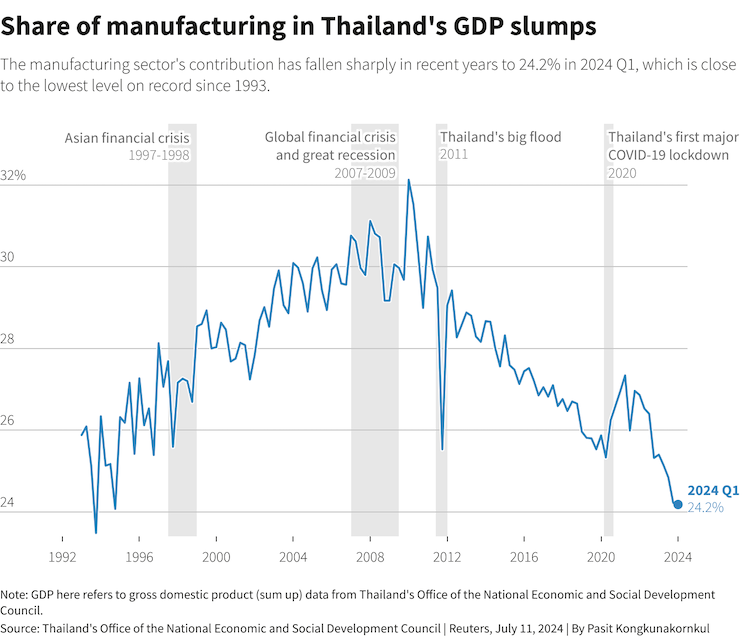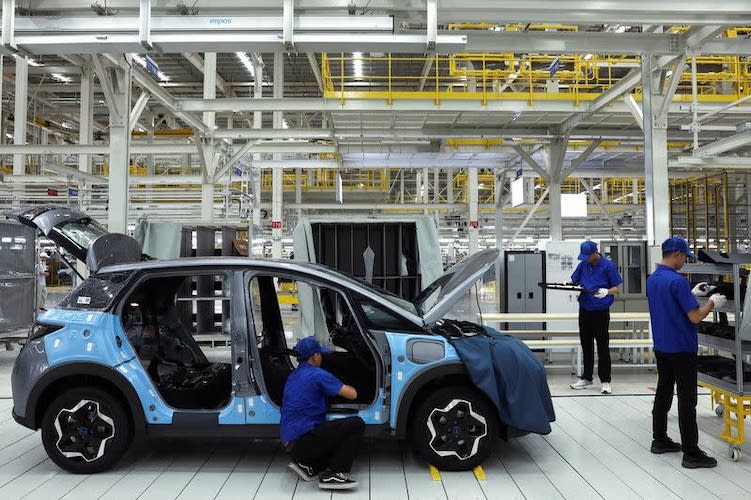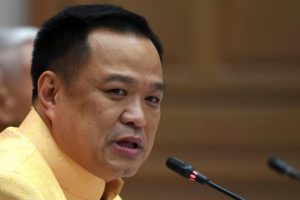The arrival of electric carmakers setting up factories in Thailand has grabbed a spotlight, but that seemingly positive news hides a grimmer reality – a spate of industrial closures and thousands of people losing their jobs.
For while Thailand won praise after Chinese electric vehicle maker BYD opened its first Southeast Asian factory earlier this month, there has also been a long list of negative outcomes stemming from a lot more than just the transition away from cars that run on petrol.
There was less attention just a few weeks earlier, when another big automobile manufacturer – Suzuki Motor – announced that it would shutter its factory in Thailand, which had produced as many as 60,000 cars a year.
The Japanese automaker’s move mirrors those by scores of other companies in Southeast Asia’s second-biggest economy which have born the brunt of cheap imports from China and a slide in industrial competitiveness due to factors such as rising energy prices and an ageing workforce.
ALSO SEE: China’s New Home Prices Fall at Fastest Pace Since 2015
Nearly 2,000 factories closed
Thailand has witnessed nearly 2,000 factory closures in the last year, upending its manufacturing sector that contributes nearly a quarter of its gross domestic product (GDP).
It is weighing on the $500 billion economy and on workers such as Chanpen Suetrong.
The 54-year-old spent nearly two decades at the VMC Safety Glass factory in central Samut Prakan province, checking the automotive and building products that rolled off the production line.
Chanpen said she was unexpectedly told in April that the factory was shutting down, leaving her without a job.
“I don’t have any savings. I have hundreds of thousands of baht of debt,” said the sole breadwinner in a family of three that includes an ailing husband and a teenage daughter. “I’m old, where will I go to work? Who will hire me?”
Monchai Praepriwngam, a director at VMC Safety Glass, declined to comment on why the factory closed.
The manufacturing sector’s woes have left Prime Minister Srettha Thavisin, who took power last year, struggling to fulfil his promise of bringing average annual GDP growth to 5% over his four-year term, up from 1.73% in the past decade.
“The industrial sector has slumped and capacity utilisation has fallen below 60%,” Srettha told parliament last week. “It is clear that the industry needs to adapt.”

Chinese imports ravage auto sector
Supavud Saicheua, chairman of the state planning agency National Economic and Social Development Council, said Thailand’s decades-long manufacturing-driven economic model is broken.
“The Chinese are now trying to export left, right and centre. Those cheap imports are really causing trouble,” Supavud said.
“You have to change,” Supavud said, arguing that Thailand should refocus on making products that China wasn’t exporting while strengthening its agriculture sector. “No ifs or buts.”
The factory closures between July 2023 and June 2024 increased 40% from the preceding 12 months, according to the latest Department of Industrial Works – data that has not been previously reported.
As a result, job losses jumped by 80% during the same period, with more than 51,500 workers left without work, the data shows.
The number of new factory openings has also slowed down, with large factories closing and small factories opening instead, Kiatnakin Phatra Bank’s research division said in a June note.
The impact has spread to industries that are the main driving force of the economy, including the automobile industry, it said.
Call for greater tariffs on cheap goods
Meanwhile, smaller manufacturers are grappling with a rise in production costs on the back of steepening energy prices and relatively high wages, Sangchai Theerakulwanich, chairman of the Federation of Thai SME, said.
“We compete with multinational businesses,” he said. “Manufacturers unable to adapt quickly had to close business or change to make something else.”
Starting this month, Thailand is collecting a 7% value-added tax on cheap imported goods priced less than 1,500 Thai baht ($41), mostly from China, but such products are still exempted from customs duties.
Nava Chantanasurakon, vice chairman of the Federation of Thai Industries, said his group has asked the government to look at measures to prevent tariff evasion amid the US-China trade war and high barriers for some Chinese goods in other regions.
For now, Thailand’s economy is projected to grow only about 2.5% this year – among the factors that have left a majority of Thais dissatisfied with Prime Minister Srettha’s performance.
Srettha has argued that his party’s controversial and delayed 500 billion-baht handout scheme that has met a barrage of criticism – including from the central bank – is essential: “It will be strong medicine to revive the economy.”
Without a steady income, Chanpen said she was waiting for the 10,000 baht ($276) handout that 50 million Thais will be eligible to receive under the plan.
“The economy was bad during the previous government,” she said, “but even after the new government has come, the economy is still as bad as before.”
- Reuters with additional editing by Jim Pollard






















